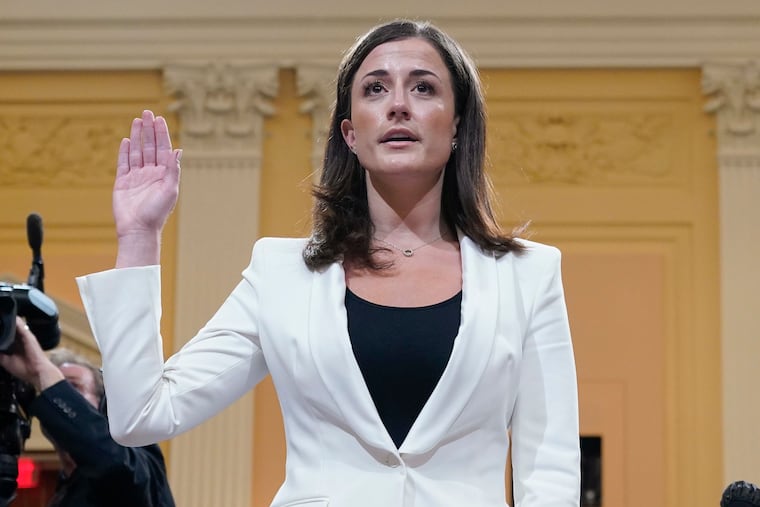As the U.S. strips away their rights, women continue to fight for the heart and soul of this country
Cassidy Hutchinson is no hero. But that doesn't mean what she did wasn't extraordinary.

Let’s just get this out of the way: Cassidy Hutchinson, the former White House aide who testified before the Jan. 6 committee, is no hero.
A hero steps up long before the damage is done. If need be, they stand alone in their quest to right a wrong, and hold people — no matter how powerful — accountable.
And they sure as hell don’t wait until the world is on fire when they had already been told who was going to light the flames.
But that doesn’t mean that what Hutchinson, a woman in her mid-20s just a few years out of college, did on Tuesday wasn’t extraordinary — especially in this moment in history.
Less than a week before she took her place in front of the Congressional committee investigating the attack on the U.S. Capitol, the nation’s top court made the decision to deprive women (just over half of the country’s population) of their fundamental right to control their own bodies.
With the stroke of a pen, women were deemed second-class citizens.
But even before that devastating decision, women were fighting for equality in this country on multiple fronts. We still are.
In the year 2022, women are still making less than men — 83 cents for every dollar.
We’re underrepresented in almost every seat of power, from the boardroom to the newsroom and just about every other room in between.
We’re also still more likely than men to live below the poverty line. (Taxing tampons instead of Viagra certainly doesn’t help.)
And all of that — and more — is worse for women of color, which only makes it all the more remarkable how often Black and brown women are at the forefront in some of these fights.
And then last week, after 50 years of controlling our own bodies, women and people who could become pregnant lost that right as well. Thanks to a ruling crafted mostly by men.
We knew it was coming, but it didn’t make the news any easier to take.
» READ MORE: Four Pennsylvanians who had an abortion reflect on life after Roe
In May, when word first leaked that the Court had voted to overturn Roe v. Wade, I spoke with four Pennsylvanians who had abortions about the ramifications of the decision. Having the right to choose saved each of their lives in various ways. When I checked back in with them after the ruling was officially released, they were understandably angry and afraid. (And we should all be afraid about the state of our country following the undemocratic rulings from the Supreme Court this term.)
But they were also committed to leaning into their frustration and fear to continue the fight — because complacency is for the privileged.
“We will fight like hell,” said Councilmember Kendra Brooks. “I’ll be in the streets with the people fighting for the city, state, and country we all deserve.”
I thought of her and others who I spoke with as I watched Hutchinson, wondering if her choice of a white blazer was an intentional nod to the suffrage movement, the decades-long fight to win the right to vote for women in the United States. (It shouldn’t go unnoticed that Hutchinson’s main questioner during the hearing was Liz Cheney, another woman who’s been praised for her determination as she wages a lonely — if belated — fight of her own to help hold Trump and his enablers accountable.)
The testimony from Hutchinson, an aide to former White House Chief of Staff Mark Meadows, made it clear that Trump and his closest advisers — all men of a certain age — knew Jan. 6 could lead to violence, and did nothing to stop the insurrectionists. After all, as Hutchinson said Meadows told her, Trump “doesn’t think they’re doing anything wrong.”
“As an American, I was disgusted,” Hutchinson said during the hearing. “It was unpatriotic, it was un-American. We were watching the Capitol building get defaced over a lie.”
Many were quick to christen her “a perfect witness;” others characterized her in far less complimentary terms, filling social media feeds with a stream of sexist and misogynistic epithets — the kind of gender-based vitriol men are never subjected to.
She was “a phony,” “a leaker,” “bad news.” And that was just from Trump, who had a meltdown on his Truth Social platform while she testified.
She was covering her own hide, others insisted, just responding to a subpoena.
I don’t doubt that part of Hutchinson’s motivation was distancing herself from people who co-signed on an attempted coup. But plenty of people have distanced themselves by keeping their mouths shut, and playing both sides to ensure they land on the winning team.
And even those who put self-interest first can do some good, as suspect as their motives may be.
As many have noted, bravery shouldn’t be assigned to people upholding the Constitution, to doing nothing more than their job — something the men in the White House failed to do on Jan. 6.
But in an America that continues to strip away half of the country’s rights while also earnestly celebrating its freedoms, this young woman showed more bravery than all the men who are still willing to silently watch the nation burn.